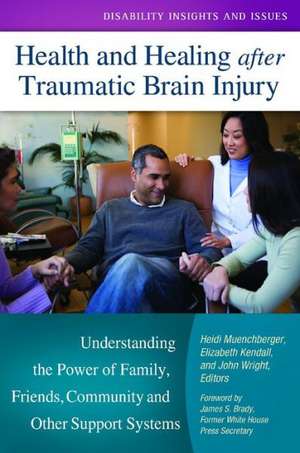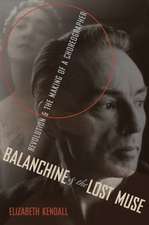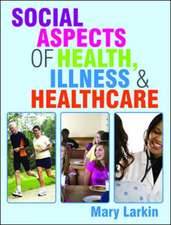Health and Healing after Traumatic Brain Injury: Understanding the Power of Family, Friends, Community, and Other Support Systems: Disability Insights and Issues
Editat de Heidi Muenchberger Cuvânt înainte de James S. Brady Editat de Elizabeth Kendall, John J. Wrighten Limba Engleză Hardback – 8 mai 2013 – vârsta până la 17 ani
Preț: 307.27 lei
Preț vechi: 482.42 lei
-36% Nou
Puncte Express: 461
Preț estimativ în valută:
58.79€ • 61.56$ • 48.77£
58.79€ • 61.56$ • 48.77£
Carte tipărită la comandă
Livrare economică 09-23 aprilie
Preluare comenzi: 021 569.72.76
Specificații
ISBN-13: 9781440828867
ISBN-10: 1440828865
Pagini: 280
Dimensiuni: 156 x 235 x 25 mm
Greutate: 0.59 kg
Ediția:New.
Editura: Bloomsbury Publishing
Colecția Praeger
Seria Disability Insights and Issues
Locul publicării:New York, United States
ISBN-10: 1440828865
Pagini: 280
Dimensiuni: 156 x 235 x 25 mm
Greutate: 0.59 kg
Ediția:New.
Editura: Bloomsbury Publishing
Colecția Praeger
Seria Disability Insights and Issues
Locul publicării:New York, United States
Caracteristici
Presents multiple viewpoints from the perspectives of consumers, practitioners, researchers, and policy makers
Notă biografică
Heidi Muenchberger, PhD, is associate professor of environmental psychology at Griffith Health Institute, Queensland, Australia.Elizabeth Kendall, PhD, is professor of community health and rehabilitation at Griffith University, Queensland, Australia. John Wright is a rural scientist who has lived with a brain injury for over 40 years and is a strong advocate for disability and wellbeing in the community.
Cuprins
Series ForewordCatherine A. Marshall and Elizabeth Kendall, Series EditorsForewordJames S. BradyAcknowledgmentsPART 1: SELF-DETERMINATION AND PERSONAL HEALING AFTER TRAUMATIC BRAIN INJURYJohn WrightFreedomErica AndersonChapter 1. Advice from the Heart: Stories of Survival and Growth following Brain InjuryLisa Guttentag LedererChapter 2. Neuroplasticity and Mindfulness in Brain Injury Rehabilitation: Cause for Great OptimismAnita Chauvin, Michelle McIntyre, and Glyn BlackettChapter 3. The Subtlety of Brain Injury: Surviving and Thriving through PlayfulnessSusan WenbergPART 2: PULLING TOGETHER RATHER THAN FALLING APART: BRAIN INJURY IN FAMILIESElizabeth KendallIn TheoryErica AndersonChapter 4. Family Resilience and Traumatic Brain InjuryMichelle McIntyre and Elizabeth KendallChapter 5. Someone to Care: Social Support after Brain InjuryMelissa KendallChapter 6. Too Small for Your Boots! Understanding the Experience of Children when Family Members Acquire a Neurological ConditionSamantha Bursnall and Kenneth I. PakenhamChapter 7. Assisting Siblings When Their Brother or Sister Sustains Acquired Brain InjurySamantha BursnallPART 3: SYSTEMS FOR HEALING: BUILDING A BETTER SERVICE SYSTEM FOR TRAUMATIC BRAIN INJURYHeidi MuenchbergerSewingErica AndersonChapter 8. Understanding Mental Health Outcomes following Traumatic Brain InjuryMaria HennessyChapter 9. The Role of Psychotherapy in Rehabilitation after Traumatic Brain InjuryRudi CoetzerChapter 10. Optimal Rehabilitation for Women Who Receive Traumatic Brain Injury following Intimate Partner ViolenceMartha E. BanksChapter 11. Holistic Neuropsychological Rehabilitation after Traumatic Brain Injury: Two Case StudiesBarbara A. Wilson, Fiona Ashworth, and Jill WinegardnerPART 4: PLACES, COMMUNITIES, AND CULTURES: DRAWING ON THE STRENGTH OF MANYHeidi MuenchbergerStandErica AndersonChapter 12. "There's No Place Like Home": The Experience of Home for Young People with Acquired Brain Injury in Residential Care EnvironmentsHayley Danielle QuinnChapter 13. The International Community-based Rehabilitation Model: A Way of Assisting People with Brain Injuries, Their Families, and CommunitiesPim Kuipers, Susan Gauld, Melissa Kendall, Sharon Smith, and Russell BowenChapter 14. Culture, Disability, and Caregiving for People with Traumatic Brain InjuryPaul LeungChapter 15. Community Leaders within a Brain Injury Self-management Program: A Valuable ResourceHeidi Muenchberger, Areti Kennedy, and Elizabeth KendallA Last Word: Charting a Positive Course for the FutureElizabeth KendallIndexAbout the Editors and Contributors









